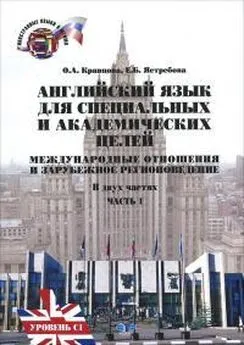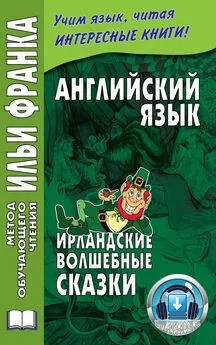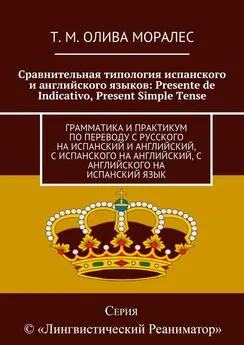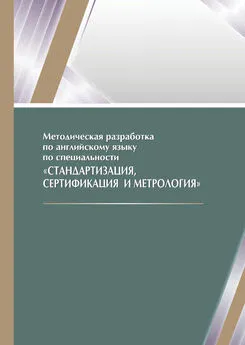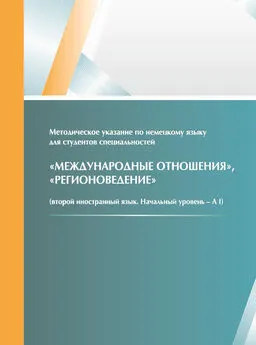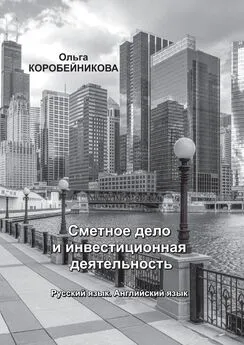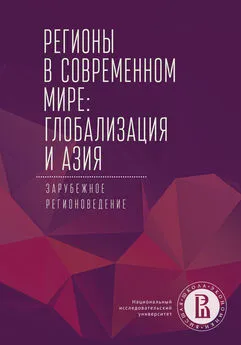Ольга Кравцова - Английский язык для специальных и академических целей: Международные отношения и зарубежное регионоведение. Часть 1
- Название:Английский язык для специальных и академических целей: Международные отношения и зарубежное регионоведение. Часть 1
- Автор:
- Жанр:
- Издательство:МГИМО-Университет
- Год:2015
- ISBN:978-5-9228-1210-8
- Рейтинг:
- Избранное:Добавить в избранное
-
Отзывы:
-
Ваша оценка:
Ольга Кравцова - Английский язык для специальных и академических целей: Международные отношения и зарубежное регионоведение. Часть 1 краткое содержание
Адресовано студентам четвертого курса факультетов и отделений международных отношений и зарубежного регионоведения.
Английский язык для специальных и академических целей: Международные отношения и зарубежное регионоведение. Часть 1 - читать онлайн бесплатно полную версию (весь текст целиком)
Интервал:
Закладка:
6. How is the lack of social mobility in the American society nowadays illustrated in the book Coming Apart by Charles Murrey?
7. What, according to the article, are the major reasons for the declining social mobility in the US?
8. What do the data concerning Harvard enrollments indicate?
1. Why, in your view, is the article entitled The End of the American Dream?
2. Do you share Niall Ferguson's opinion about poverty traps created by welfare programmes?
3. How does this tally (согласуется) with the fact that the countries with the highest social mobility are Denmark, Norway, Finland, and Canada, i.e. welfare states?
4. What do you think might be the outcomes of the US becoming a less meritocratic society?
a) problems in the US education system today
b) modern American society
c) social mobility in the country whose language you study


VOCABULARY PRACTICE 2
1. to succeed in achieving or winning something difficult
2. to roughly calculate or judge the value, number, quantity, or extent of
3. to dismiss someone or something as insignificant
4. a difference or contrast between similar things or people
5. in a way that is not directly expressed
6. a thing that blocks one's way or prevents or hinders progress
7. relating to money or currency
8. a person or thing that receives or is awarded something
9. flourishing or spreading unchecked (especially about something unwelcome)
10. in a way that does not change or vary
10. expressed, _________________, ____________________, _________________ implicitly.
Unit II. US: from Democracy to Empire?
Unit II. US: from Democracy to Empire?
1. The vast scale of the global fishing fleet has always been an _______________________ to
sustainable fisheries management.
2. Even though there is _______________________ u n em p l oyme n t in many parts of the world,
there are still large numbers of jobs that are going unfilled because employers are having a hard time identifying people with the right set of skills.
3. The elder Republican Senator, who everyone in the political establishment thought was far
too moderate to win the nomination, managed _______________________ t h e nomination.
4. The Swiss National Bank (SNB) conducts the country's _______________________policy as
an independent central bank.
5. _______________________ of welfare benefits and food stamps may now have to undergo
a drug test to determine their eligibility due to a new bill signed this week.
6. Prejudice that is _______________________ s t i l l has the same harmful effect as prejudice
which is consciously practiced to those who suffer because of it.
7. There is an obvious _______________________between Hamas, the true war criminal, and
the Palestinians who are suffering in Gaza.
8. You shouldn't _______________________ the US economy just yet because the resilient U.S.
economy is fully capable of finding a path to full recovery and decent growth.
9. It is difficult _______________________ the carrying capacity of the planet, since this de
pends on the technologies available, our efficiency in the use of resources, and the acceptable standard of living.
10. The Vice-President of Vietnam emphasised Vietnam's _______________________ policy of
joining other ASEAN members in boosting ASEAN-Russia ties in a comprehensive manner.
LISTENING 2

Is the American Dream real? http://www.youtube.com/watch?v=iYGc8-L_NmE
1. To hitch one's wagon to a star — try to succeed by forming a relationship with someone who is already successful
2. Pretentious — attempting to impress by affecting greater importance or merit than is actually possessed
3. Metric — a system or standard of measurement
4. To allow for — make provision or provide scope for
1. Craigslist is the brainchild of Craig Newmark, and has become one of the most popular sites on the Internet. Started in San Francisco in 1995, it is perhaps the ultimate site for classified listings. It offers job advertisements, personal ads, ads for cars, pets, home supplies and a plethora of other choices.
2. Andrew Carnegie (November 25, 1835 — August 11, 1919) was a Scottish American industrialist who led the enormous expansion of the American steel industry in the late 19th century. He was also one of the highest profile philanthropists of his era and had given away almost 90 percent — amounting to, in 1919, $350 million (in 2014, $4.76 billion) — of his fortune to charities and foundations by the time of his death. His 1889 article proclaiming «The Gospel of Wealth» called on the rich to use their wealth to improve society, and stimulated a wave of philanthropy. Carnegie was born in Dunfermline, Scotland, and emigrated to the United States with his very poor parents in 1848. Carnegie started as a telegrapher and by the 1860s had investments in railroads, railroad sleeping cars, bridges and oil derricks.
1. Why do you think the US is one of the most popular destination countries for immigrants?
2. Is the American dream still a reality?
1. What does the story of the East European immigrant illustrate?
2. What does becoming rich or poor in the US mostly depend on nowadays?
3. Why should social mobility and equality of opportunity be called the Danish dream in the 21 stcentury, according to the video?
4. Do women in the US have the same economic opportunities as men?
5. In what sense does the American dream remain uniquely American?
6. What is the effect of redistributive tax policies on innovation?
7. Why, according to the video, the US might become increasingly less appealing to smart professional people?
8. Why is the systemic inequality of opportunity bad for all Americans?
1. ______% of American men raised in the bottom 20% of incomes stay there, while in the UK
that number is _______%, and in Denmark _____%.
2. In the United States, women make _____ cents for every dollar that men make in the workforce.
In _____________ the situation is even worse.
3. In ______________ women make 83 cents for every dollar men make; in Sweden it is ____.
4. The most underrated country is _________________, where women make ______ cents for
every dollar that men make in the workforce.
5. A lot of innovative companies like ____________, ______________, and _______________
started in the US.
“It would be a society with extremely high and rising inequality yet little circulation of elites. A society in which the pillar institutions were populated by and presided over by group of hypereducated, ambitious overachievers who enjoyed tremendous monetary rewards as well as
Unit II. US: from Democracy to Empire?
Unit II. US: from Democracy to Empire?
unparalleled political power and prestige and yet who managed to insulate themselves from sanction, competition, and accountability, a group of people who could more or less rest assured that now that they have achieved their status, now that they have scaled to the top of the pyramid, they, their peers, and their progeny 1will stay there.” (Twilight of the Elites: America After Meritocracy by Christopher Hayes.)
SPEAKING
READING 3
1. Can you define the term exceptionalism? Does it necessarily imply superiority?
2. Is it typical of great nations to consider themselves exceptional? Can you give examples of what such nations pride themselves on or did so in the past?
The idea that the United States is uniquely virtuous may be comforting to Americans.
Too bad it's not true.
By Stephen M. Walt 34 34 Progeny — a descendant or the descendants of a person, offspring
35 35 Stephen Martin Walt (born July 2, 1955) is an American professor of international affairs at Harvard University's John F. Kennedy School of Government.
http://www.foreignpolicy.com/articles/2011/10/11/the_myth_of_american_exceptionalism
Over the last two centuries, prominent Americans have described the United States as an “empire of liberty”, a “shining city on a hill”, the “last best hope of Earth”, the “leader of the free world, and the “indispensable nation”. These enduring tropes explain why all presidential candidates feel compelled to offer ritualistic paeans 36 36 Paean ['pi :an] — a joyous song or hymn of praise, tribute, thanksgiving, or triumph
to America's greatness and why President Barack Obama landed in hot water — most recently, from Mitt Romney — for saying that while he believed in “American exceptionalism”, it was no different from “British exceptionalism”, “Greek exceptionalism”, or any other country's brand of patriotic chest-thumping.
Most statements of “American exceptionalism” presume that America's values, political system, and history are unique and worthy of universal admiration. They also imply that the United States is both destined and entitled to play a distinct and positive role on the world stage.
The only thing wrong with this self-congratulatory portrait of America's global role is that it is mostly a myth. Although the United States possesses certain unique qualities — from high level of religiosity to a political culture that privileges individual freedom — the conduct of US foreign policy has been determined primarily by its relative power and by inherently competitive nature of international politics. By focusing on their supposedly exceptional qualities, Americans blind themselves to the ways that they are a lot like everyone else.
Читать дальшеИнтервал:
Закладка:
